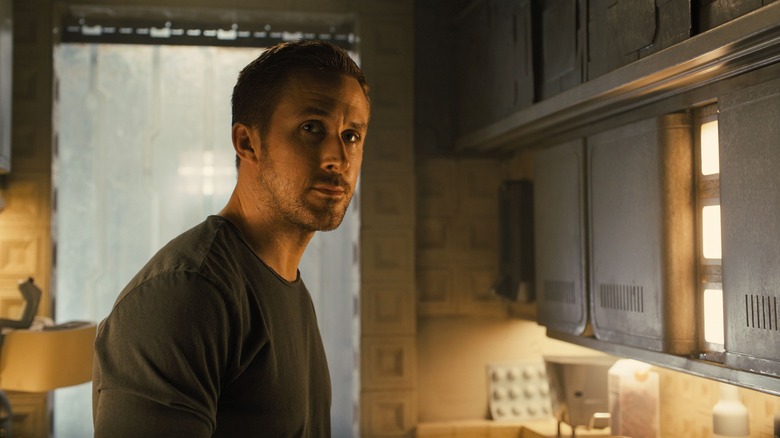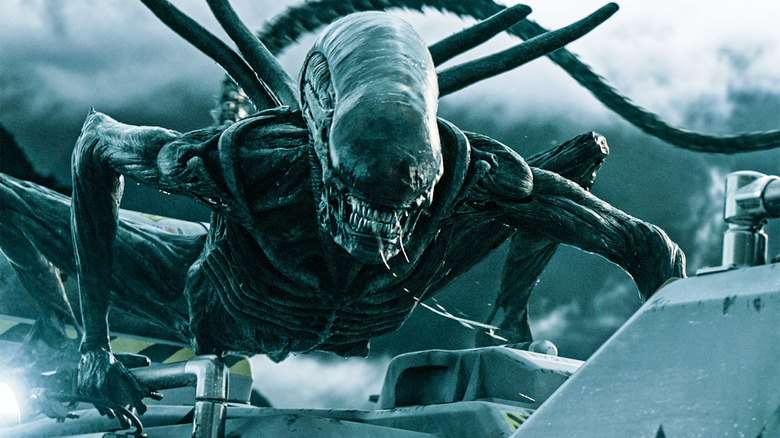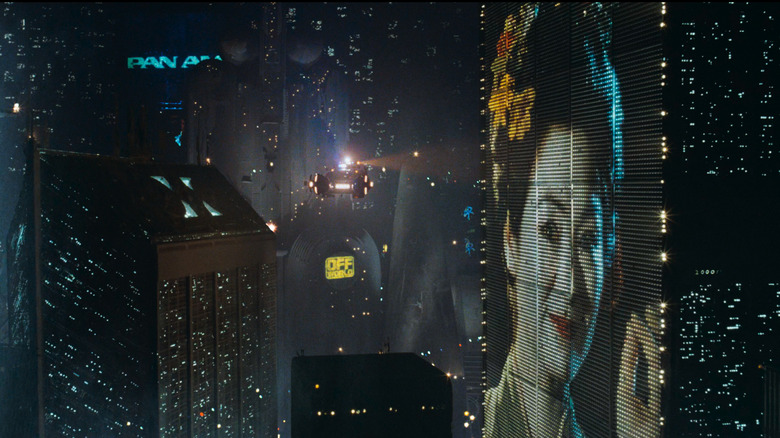Ridley Scott Was Forced To Choose Between Blade Runner 2 And Alien: Covenant
Ridley Scott's original "Blade Runner" will always continue to be the gold standard of dreary, cyberpunk sci-fi. Although it took time for it to be as highly regarded as it is today, Scott's dystopian futuristic noir is a masterpiece that has yet to be equalled, even if Denis Villaneuve's startling sequel, "Blade Runner 2049," came awfully close.
It's rare to be remembered for even one landmark science fiction film that exists on the same level that "Blade Runner" occupies, let alone be responsible for two revered classics. Yet, that's exactly what Scott was able to accomplish with "Alien." Within a span of three years from 1979 to 1982, Scott spawned both properties and eventually spun H.R. Giger's indelible Xenomorph design into a successful franchise.
Over time, it's been revealed that "Alien" and "Blade Runner" actually exist within the same universe. In a perfect world, Scott would have been able to return to tell more stories within that sci-fi framework any time he wanted to. After his 2012 film "Prometheus" chose to jettison the established "Alien" mythology in favor of a bold, creationist prequel about the origins of life, Scott proved once again that he knew what sci-fi horror audiences wanted to the tune of $403 million worldwide.
Unfortunately, when it came to continuing the narrative that Scott started over 40 years ago, the legendary filmmaker wound up in a position where he was forced to choose between "Alien: Covenant" and "Blade Runner 2049."
Stuck between a Neomorph and a Skinjob
In the September issue of Empire, Scott intimated that he eventually had to bow out of directing "Blade Runner 2049" due to a scheduling conflict with "Alien: Covenant" (which was due to be in production around the same time). "I shouldn't have had to make that decision," Scott said about the unfortunate time constraint. "But I had to. I should have done 'Blade Runner 2.'" His comment seems to point the finger at Warner Bros., implying that both pictures were locked into a specific release window which took precedence over Scott returning to direct the sequel. The films were ultimately released some five months apart, with "Alien: Covenant" arriving in May 2017 followed by "Blade Runner 2049" in October of that same year.
"Alien: Covenant" tried to marry the slasher-movie-in-space aspects of "Alien" with a more Gothic sci-fi narrative involving Michael Fassbender's David, but it didn't quite coalesce for me, personally. It still would have been fascinating to see how Scott's approach would have differed from Villeneuve's on "Blade Runner 2049." The symmetry of having Scott return to the director's chair may have even enticed more moviegoers to come out and see the "Blade Runner" sequel, which didn't exactly light up the box office upon its initial release.
While filming "Blade Runner 2049," Villeneuve still had to contend with Scott on set looking over his shoulder as an executive producer. Villaneuve told IndieWire:
"He told me right at the start he would give me all the space, all the freedom, he would step away and that would be my responsibility, and if I needed him, he would be at the other end of the line. Otherwise, I would be alone. That was the best gift to receive, because I would have never been able to work with Ridley behind me."
Will the new Alien and Blade Runner projects honor the legacy?
Given the critical success of "Blade Runner 2049" and the evergreen appeal of the "Alien" franchise, it's not surprising that the major studios and streaming companies out there are looking to mine these IP for their own profit. (The Weyland-Yutani Corporation and Tyrell Industries would be proud.) All told, director Fede Álvarez ("Don't Breathe") has just shot a new "Alien" film for 20th Century Studios, Noah Hawley is developing an "Alien" TV show set on Earth (finally), and Prime Video has a "Blade Runner 2099" series in the works for a 2024 premiere.
Scott remains on board all three projects as a producer. Speaking specifically about "Blade Runner 2099," Scott touched on how much connective tissue the new series will have with his original vision. "It's all set years on. To me, it circles the idea of Aldous Huxley's 'Brave New World,'" he told Empire. Philip K. Dick's novel "Do Androids Dream of Electric Sheep?" has long been recognized as the direct inspiration for Scott's 1982 original, but Huxley's ominous warning concerning mass corporate control in "Brave New World" is absolutely in line with the subtext in "Blade Runner."
Beyond that, Sigourney Weaver has gone on record saying she's done playing Ripley for good, giving Alvarez and Hawley a little more room to breathe when it comes to their "Alien" projects. However, neither one will continue the chronology of "Prometheus" and "Covenant," with Scott telling Empire, "They're all new."
With the torch being passed to a new generation of filmmakers, it's likely that Scott will stay on in a producing capacity on these and any other "Alien" and "Blade Runner" projects that come to pass. Here's hoping they honor the franchises' respective legacies with compelling storylines and don't just feel like cash grabs.


